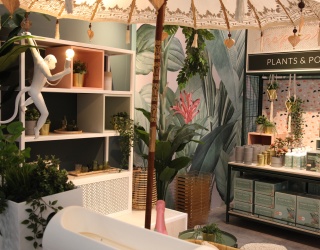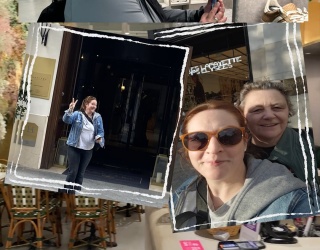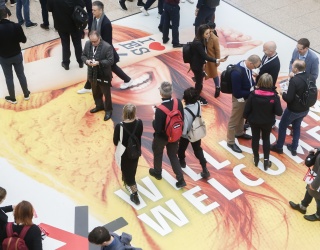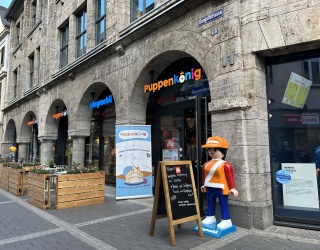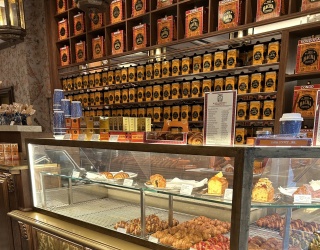Sustainability has become a competitive factor in retail, according to Kai Falk. That’s why companies invest in energy saving measures in their supply chain, retail stores and line of products. In the HDE spokesperson’s opinion, companies primarily count on energy reduction measures when it comes to shop fitting.
At the HDE you are in charge of communication and sustainability. What does sustainability mean to you?
Above all, sustainability to me means also protecting the livelihood of future generations. Ecological and social responsibilities as well as economical success are closely connected. That’s why sustainable actions are an investment in the future of companies and society.
Is “green“ a trendy issue in retail at the moment?
It certainly is not a trendy issue that’s “in“ today and by tomorrow is forgotten already. Green, organic, environmental-and climate awareness, sustainability – this is a continuing development. The topic has long been on retail’s agenda. There is a broad spectrum of sustainable activities at companies.
The public often views retailers quite critically: industrial food, poor working conditions for employees, dumping pricing for farmers and workers in the Third World. Can social responsibility turn things around?
These reproaches do not reflect the reality in the retail industry. Let’s not forget that the retail industry provides every twelfth job and pays most employees salaries based on collective agreements. What’s more, retail is much more involved in training than other industry sectors. Without retail, many young people would not have any prospects. And cost and quality are not just great selling points, but actually also a sustainable contribution of retailers to social wealth. Never before were high-quality and at the same time affordable goods accessible to such a broad group of buyers. Of course it is important for delivery-and production conditions to be as ecological and socially acceptably designed as possible. Retail companies in collaboration with manufacturers and suppliers are committed to this goal.
Sustainability in retail sales – what makes sense in your opinion and what doesn‘t?
Sustainability will only prevail where it pays off for companies in the long run. This also made it a definite factor in terms of competition. And that’s why companies invest in energy saving measures in their supply chain, retail stores and line of products.
Isn’t there still a lot of unutilized potential in energy management?
The profit margin is influenced by many factors. Thrifty energy consumption is a building block with a lot of potential. For many years, retailers have practiced active energy management. A large portion of economically marketable potential in retail has already been utilized or companies are planning to utilize these potentials within the scope of reorganizations.
What kind of “green“ trends do you see in shop fitting?
They are predominantly energy reduction measures. This makes sustained and economic sense. I am thinking about efficient building insulation for example, an economic and eco-friendly technology for lighting and cooling, or also using green electricity.
Suppliers at the EuroShop view LEDs as a hot trade fair topic in terms of sustainability. Do you share this enthusiasm?
LEDs are certainly exciting. Each retailer should check though whether it makes sense for him, to choose these or other solutions.
You can also save a lot of energy in cooling. What is important from a retailer’s point of view?
Retailers approach this from different angles. For example, increasingly closed refrigerated display cases with glass doors or glass sliding doors are being used. When equipment gets replaced or is newly purchased, often a decision in favor of energy-efficient appliances is made. With existing equipment, during maintenance and service calls cooling fluids are in part replaced by climate friendly coolants. But it is always important to maintain a balance between ecological and economical advantages.
You advertise for beverage cans. Is this sustainable?
When the bottle deposit was introduced seven years ago, a product that was popular with consumers almost disappeared from the market. Today, cans are simply classics and the environmental aspect has improved. After all, now they almost entirely consist of recyclable material.
Full shelves in supermarkets and bakeries until closing time – and then a lot of things end up in the trash. Shouldn’t consumers and retailers start to rethink?
The food trade is very interested in avoiding food spoilage. It succeeds thanks to sophisticated inventory management systems, with which food supply is better and better adjusted to customer demand. The grocer orders at more frequent intervals and in smaller quantities. In addition, companies regularly check expiration dates and product quality. Many companies work closely with food banks and donate food that is still edible, but where the sell-by date for instance would expire in a few short days. Merchandise that’s past its expiration date needs to be disposed of. It can no longer be sold even just due to the high requirements on quality, hygiene and safety.
Interview by René Schellbach, Euroshop.de




